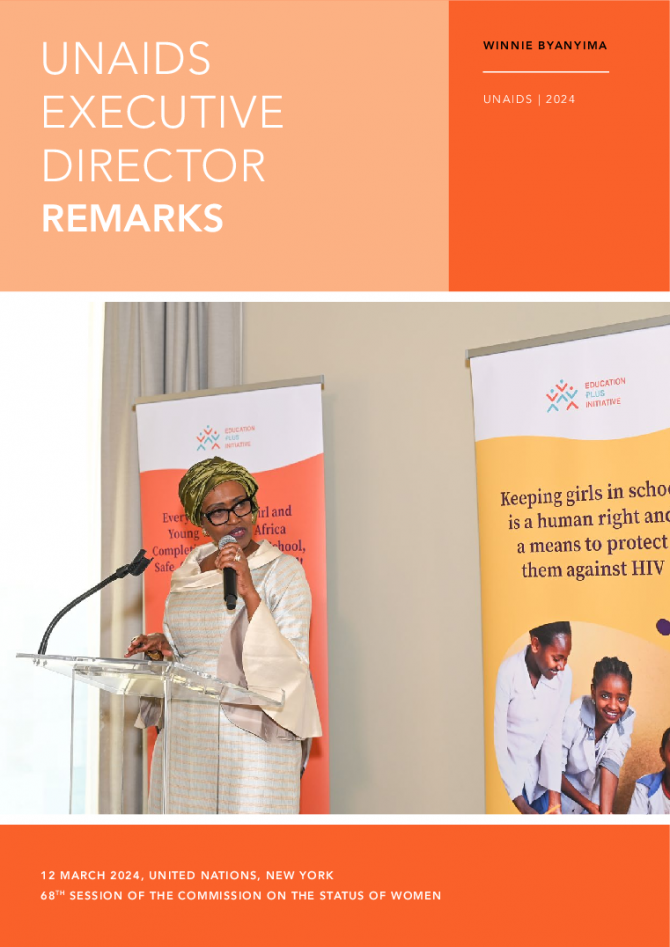
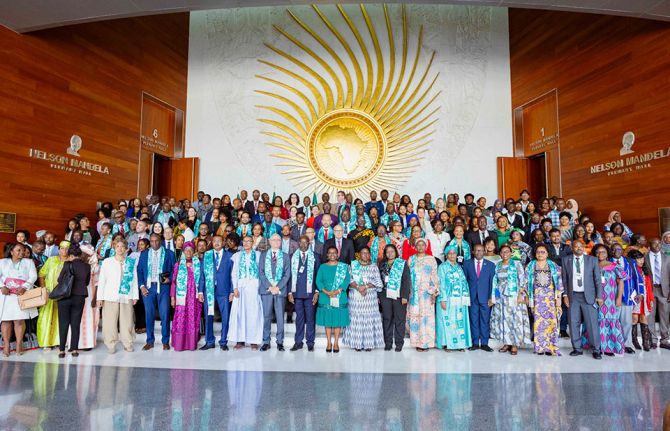

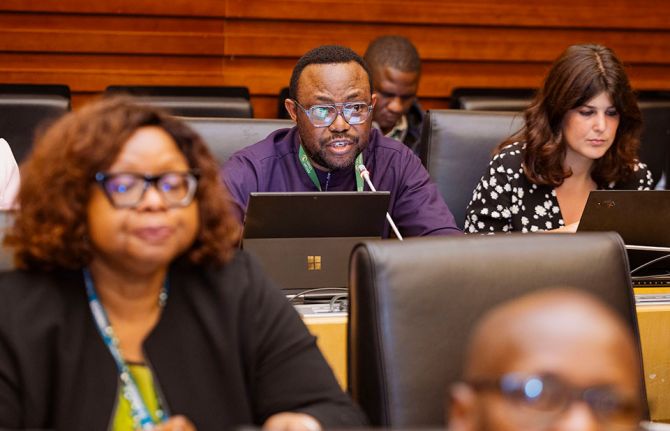
Feature Story
Girls’ education for HIV prevention at 1st Pan-African Conference on Girls’ and Women’s Education in Africa
08 July 2024
08 July 2024 08 July 2024Girls’ education as a tool to prevent HIV infection has been centered at the 1st African Union Pan-African Conference on Girls’ and Women’s Education in Africa. This followed African leaders designating education as the 2024 African Union theme of the year.
At a high-level side event hosted by the Education Plus Initiative on the first day of conference held at the African Union Commission in Addis Ababa, Ethiopia, leaders, girls’ and women’s networks and advocates called for greater investments in girls’ education.
“Some people claim that providing girls with secondary education is too expensive. Such claims fail to consider the exponentially higher cost of not educating them,” said UNAIDS Executive Director, Winnie Byanyima. “We can get all our girls and boys to complete secondary education; that should be our legacy."
UNICEF calculates that 34 million girls in sub-Saharan Africa are out of secondary school. According to the Global Education Monitoring (GEM) Report 2023, in all regions in Africa, there are more girls out of school at the secondary level than boys, with gender disparities worsening as children move up to higher levels of education in favour of boys over girls. In sub-Saharan Africa, less than half of adolescent girls complete secondary education, their percentage standing at 42% and there has been no progress at all in closing this gap in the past 20 years. Sub-Saharan Africa is the region furthest from parity at the expense of girls, with no progress since 2011 at the lower secondary level and since 2014 in upper secondary.
Gender is a key factor linked to disparities in enrolment, retention, completion, and learning outcomes through social conditioning, gender-based differences in parental expectations and education-related investments, child marriages and early childbearing, female genital mutilation, child labour, gender-based violence, period poverty and discrimination.
More than forty years into the HIV response, Africa remains an epicenter of the AIDS epidemic with adolescent girls and young women being disproportionately affected. Every week 3100 adolescent girls and young women acquired HIV in sub-Saharan Africa. Every three minutes, an adolescent girl or young woman aged 15-24 years acquired HIV in 2022 in sub-Saharan Africa. Adolescent girls and young women aged 15-24 years in the region were more than three times as likely to acquire HIV than their male peers in 2022.
UN agencies, African Union representatives, government ministers, and young women leaders called for accelerated actions to translate commitments to action through leveraging girls' education for gender equality and preventing HIV, child marriage, teenage pregnancies, violence, gender-related stigma and discrimination in Africa.
Speakers emphasized the connection between health and education. Ministers spoke about key policy reforms and best practices aimed at promoting girls' education, including creating safe and inclusive school environments, strategies to get girls into secondary school, and the readmission policy that addresses high dropout rates due to pregnancy. UN co-leads emphasised the need for improved collection of data disaggregated by sex and other relevant population characteristics to better understand educational participation, progression, and learning, and using gender-sensitive data for policymaking and planning.
Other issues highlighted included the integration of digital literacy programs into the secondary education and vocational training curriculum to facilitate smooth transitions from school to employment; integrate gender equality into all aspects of the education system, including curriculum-based comprehensive sexuality education and life skills, address gender-based violence within schools and discriminatory laws and practices, and access to information, non-discriminatory HIV and sexual and reproductive health services access.
Young women leaders spoke on the role of partnerships and young women's leadership. Participants highlighted the upcoming 30th anniversary of the Beijing Declaration as an opportunity moment to accelerate accountability and commitments, as well as the CSW Resolution 60/2, Women, the Girl Child and HIV and AIDS as significant mechanisms to address political and resource gaps so no woman or girl is behind in the HIV response.
Education Plus is a rights-based, gender-responsive action agenda to ensure adolescent girls and young women have equal access to quality secondary education, alongside key education and health services and support for their economic autonomy and empowerment. Co-led by five UN agencies, the initiative builds on existing frameworks like the Transforming Education Summit, the Continental Education Strategy for Africa (CESA) and the Dakar Education for All (EFA) Declaration to push for access and completion of education for women and girls in Africa.
Quotes
" Some people claim that providing girls with secondary education is too expensive. Such claims fail to consider the exponentially higher cost of not educating them. We know the consequences when girls can’t finish secondary school: higher risks of sexual violence, early marriage, unwanted pregnancy, complications in pregnancy and childbirth, and HIV infection. But when a girl completes secondary school, it helps her to be safe and strong. If all girls complete secondary education, adolescent pregnancy could be cut by 75% and early marriage could be virtually eliminated. An extra year of secondary school can increase women’s eventual wages by 15-25%. We can get all our girls and boys to complete secondary education; that should be our legacy."
We must recognize the intersecting challenges girls face, including HIV. They face extraordinarily high levels of HIV infections. Women and girls represented 63% of all new HIV infections in Africa in 2022. Empowering girls with knowledge is key to ending AIDS as a public health threat. Education is the best HIV prevention tool available.”
“African nations should ensure that young people not only gain vital knowledge but also acquire life skills, values, attitudes, and make decisions in order to live healthy and fulfilled lives. Through the AU strategy, we will see increased awareness about the importance of investing in education and the health of children and adolescents.”
“Girls’ education is not only a right, but will also result in broad socio-economic development for countries. We are creating a safe and conducive environment for adolescent girls and young through the criminalization of child marriage, FGM, school-related gender-based violence, and sexual harassment, particularly sexual exploitation perpetrated by teachers. We provide life skills and comprehensive sexuality education in schools and ensure an inclusive school environment for children with disabilities, with specific attention to girls. We have enhanced social protection strategies, including cash transfers to poor households to ensure that girls go to school and are not engaged in care work and child labour.”
“Girls who dropped out due to early pregnancies or early unwanted pregnancies are readmitted. We have a national girls’ education strategy aimed at facilitating the pace at which Malawi may achieve sustainable development goals. We emphasize universal primary education, the promotion of gender equality and empowering women.”
“We are trying to remove the cultural norm barriers and negative gender stereotypes that contribute to gender-based violence and discrimination against adolescent girls and young women with a male engagement strategy. Inclusive education provides special provisions for the less privileged and disadvantaged children and youth; user-friendly infrastructure, teaching and learning materials and provision of expert teachers.”
“Education is a human right. The Education Plus Initiative is driving policy changes in Africa. Education Plus seeks to keep adolescent girls and young women in school by simply unequivocally saying no to child marriage, no to violence, no to HIV infections, no to gender-related stigma, and of course, no to harmful practices. We want to keep girls in secondary education and make sure they stay there and complete their education. We do that by supporting sexual and reproductive health and rights, comprehensive sexuality education and work for integration HIV awareness, preventing and managing learners pregnancies and addressing school-related gender-based violence.”
“We need to scale up effective interventions to increase HIV knowledge and transform gender norms, and hence girls’ access to services. We should explore the potential of innovative solutions offered by digital technologies to mobilize and provide young women and adolescent girls with comprehensive HIV information. Let's do more, particularly for those girls living with HIV to be meaningfully engaged in the HIV response. Young women must have a formal seat and a safe space to raise their needs. let's move from rhetoric to action.”
“The numbers are unfortunately very clear: highest adolescent pregnancy rates of the world are in sub-Saharan Africa, highest percentages of women first married or in union before 18, young women more than 3 times as likely of HIV infection, or unacceptably high rates of justification of wife beating among adolescents. Fortunately, we benefit from a strong set of political commitments and strategies to face these issues. There is the Education Plus Initiative, the WCA Commitment for Educated, Healthy and Thriving Adolescents and Young People, the ESA Commitment, and the AU Continental Strategy on Education for Health and Wellbeing of Young People in Africa. It is high time to convert the commitments and strategies in concrete results for adolescent girls and young women.”
“Girls need an affirming environment. Where there's ignorance, there's a lot of resistance to education and sexuality education in the curriculum. We need to engage to change the environment, talking with parents, men and boys, community members and leaders for them to have access to information because they have a great influence on the lives of these young people. We need inclusive advocacy, especially the rural grassroots and true localization of information and interventions.”
Our work
Related

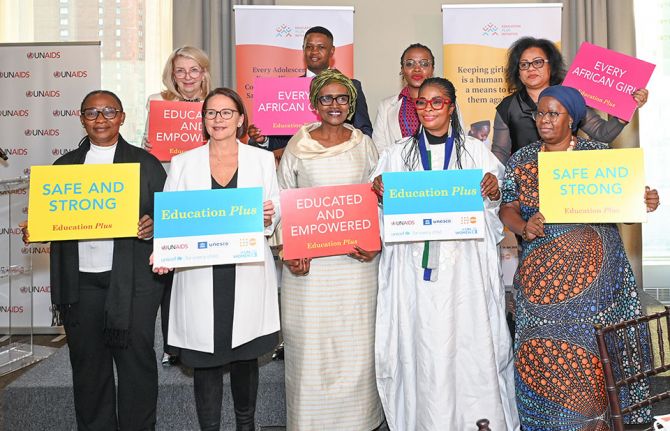
Feature Story
Invest in women and girls’ education and health rights to end AIDS in Africa
11 March 2024
11 March 2024 11 March 2024Despite substantial declines in new HIV infections globally, the HIV/AIDS epidemic continues to disproportionately impact adolescent girls and young women in many countries, particularly in sub-Saharan Africa. In 2022, there were 3,100 new weekly infections among adolescent girls and young women aged 15-24 years. In sub-Saharan Africa, adolescent girls and young women accounted for more than 77% of new infections among people aged 15-24 years in 2022.
That’s why Education Plus Initiative co-hosted with the Grand Duchy of Luxembourg a high-level side event on the margins of the 68th Commission on the Status of Women (CSW68) to bring attention to the cost of inaction, calling for more consistent investment in education, health and economic rights of adolescent girls and young women in Africa. The CSW, which runs from 11- 22 March 2024, is the United Nations largest annual gathering on gender equality and women’s empowerment, with this year’s priority theme, Accelerating the achievement of gender equality and the empowerment of all women and girls by addressing poverty and strengthening institutions and financing with a gender perspective.
Speakers included four ministers from Luxembourg, Benin, Sierra Leone, and Uganda, senior government officials from Cameroon and South Africa, and heads of UN agencies who co-lead Education Plus, ATHENA network. Hannah Dolly Kargbo, a young activist from Freetown, Sierra Leone, and founder of the Girls Advocacy Development Network (GADNET), pre-recorded a video that showed her work with young people to advance rights.
The event, Education Plus investment cases for transformative results: leveraging girls completion of secondary education for gender equality and HIV prevention mobilized government, partners and key stakeholders towards accelerated actions and translate commitments to action for gender equality and HIV prevention in Africa.
The costs of inaction on the rates of HIV in adolescent girls and young women remain significant, not only counted in terms of the harmful impacts on girls’ lives but in how they undermine prospects for poverty eradication and the well-being and resilience of families, communities, societies and national economies. For instance, the lack of educational and economic opportunities that result in women’s diminished labour force participation is estimated to cost the African region US$60 billion in economic losses every year. And yet Africa could gain US$500 billion per year through multi-sectoral investments in adolescents and youth, especially girls, by capitalizing on demographic windows of opportunity.
Education Plus calls for investment in the education and empowerment of adolescent girls and young women, and 15 champion countries are already committed to using education as a means to reduce high HIV rates. Investments that guarantee education for all young people, violence-free school environments, provision of stigma-free health services, comprehensive sexuality education, access to sexual reproductive health and rights services and economic autonomy and empowerment are key to ending AIDS as a public health threat by 2030. When adolescent girls and young women complete secondary school, their risk of getting HIV is reduced significantly.
Quotes
“We must take immediate action to change this situation, get girls back to school and ensure they complete secondary education. This requires commitments made by African member states to address gender inequalities, stigma and discrimination that fuels these infections fulfilled. There is progress in Africa, but it simply isn't fast enough. That's why we have this initiative - Education Plus”
“What I find extremely worrying is the surge in extreme conservative policies on sexual and reproductive health and rights. This is across the world but also in sub-Saharan Africa. We must avoid going back in time. We need to empower girls because it's the only way that we will have women empowered.”
“We can make HIV a disease of the past, but we can't do it without listening to understanding and supporting young girls and women to take the lead. Now is the time to ensure that every girl lives a life free from violence with unhindered access to quality education, to sexual and reproductive health rights and services and with meaningful opportunities to lead a productive life.”
"We know that investing in girls' education and health is an important lever. We can't build our country's development by leaving out 53% of our population"
“Under the radical inclusion policy, we are bringing pregnant girls back to school, retain girls when they become pregnant. So, education and HIV go a long way! When they are educated and have an awareness of HIV, their well-being, and reproductive and sexual rights, they are more assertive when negotiating safer sex.”
“Adolescent girls and young women's organizations are the least funded. Only less than 5% funding of gender equality goes to women's rights organizations, even less goes to young feminist-led organizations. We need to keep the ones who are most affected, most impacted leading the response. We're not here to ask for leadership but to offer leadership to co-lead alongside you.”
"It is now a policy that when constructing a school, you must have sanitary facilities separate for both girls and boys, and girls changing rooms and space. We also have intensified education, communication and advocacy on HIV/AIDS and opened schools to give information on sexual and reproductive health. We are working with girls who have dropped out of school to skill them."
“Girls are unable to live up to their full potential because of barriers, but those barriers are dismantlable. Africa is not poor, but African women and girls are licking a spoon, a spoon they do not even own, so let's shift the discourse so that the resources also available in the countries are prioritized for investing in education, HIV prevention and investing in girls.”
Watch
Our work

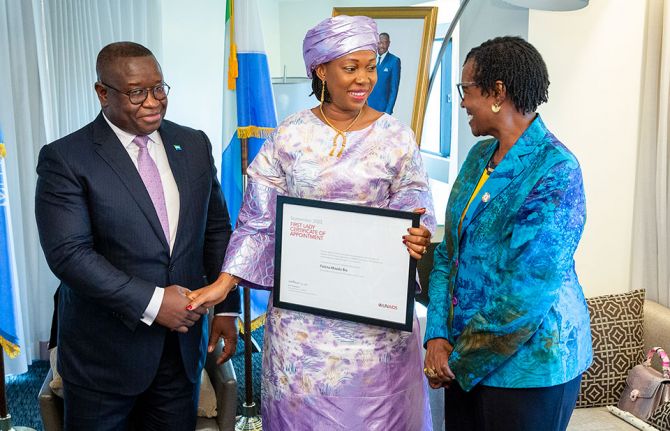
Press Release
UNAIDS appoints the First Lady of Sierra Leone as a champion for adolescent girls and young women
19 September 2023 19 September 2023NEW YORK/GENEVA, 19 September 2023—UNAIDS has named the First Lady of Sierra Leone, Fatima Maada Bio, as a UNAIDS champion for the empowerment and engagement of adolescent girls and young women in Sierra Leone. UNAIDS Executive Director, Winnie Byanyima, confirmed the appointment during a meeting with Mrs Maada Bio and her husband President Julius Maada Bio at the 78th session of the United Nations General Assembly taking place in New York.
“I am delighted to welcome Her Excellency Mrs Fatima Maada Bio to the UNAIDS family as a champion for adolescent girls and young women,” said Ms Byanyima. “The First Lady is a strong advocate for the empowerment of women and girls. I look forward to continuing to work together to end gender inequalities that drive HIV including sexual and gender-based violence, and to ensuring that our girls and young women have all the information and knowledge they need to lead healthy lives.”
Mrs Maada Bio is a leading advocate for the Hands Off Our Girls Campaign, a movement launched by President Maada Bio in December 2018 to ban early child marriage and end sexual violence against women and girls. In 2022, she spearheaded the adoption of the first ever World Day for the Prevention of, and Healing from Child Sexual Exploitation, Abuse and Violence, which is commemorated annually on 18 November.
Mrs Maada Bio is also a champion of Education Plus, an initiative launched by UNAIDS, UNESCO, UNICEF, UNFPA and UN Women to prevent HIV infections through free universal, quality secondary education for all girls and boys in Africa, reinforced through comprehensive empowerment programmes.
“My hope is for a future where all women have equal rights,” said Mrs Maada Bio. “Where women and men can sit at the same table and make decisions together, where women are given the space to lead. That is my hope because then we will know that real equality has arrived for us all.”
UNAIDS
The Joint United Nations Programme on HIV/AIDS (UNAIDS) leads and inspires the world to achieve its shared vision of zero new HIV infections, zero discrimination and zero AIDS-related deaths. UNAIDS unites the efforts of 11 UN organizations—UNHCR, UNICEF, WFP, UNDP, UNFPA, UNODC, UN Women, ILO, UNESCO, WHO and the World Bank—and works closely with global and national partners towards ending the AIDS epidemic by 2030 as part of the Sustainable Development Goals. Learn more at unaids.org and connect with us on Facebook, Twitter, Instagram and YouTube.
Region/country

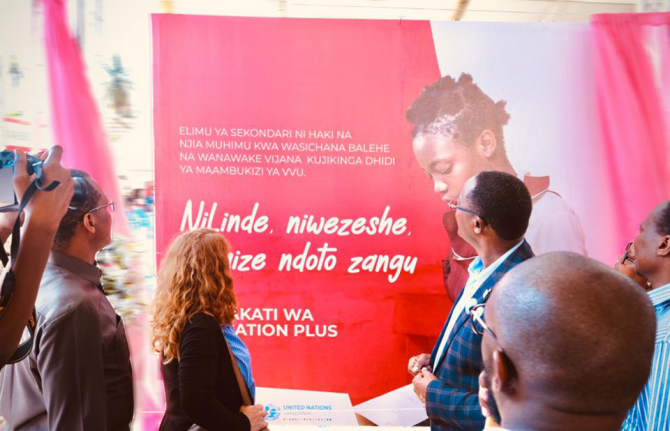
Feature Story
Tanzania commits to invest in secondary education as part of efforts to keep boys and girls free from HIV
16 December 2022
16 December 2022 16 December 2022Tanzania became the 13th African country to join the Education Plus Initiative, committing to provide greater investments to ensure boys and girls complete secondary school.
Education Plus is an initiative spearheaded by UNAIDS to accelerate action and investments in education to prevent HIV. Evidence shows that completing secondary education reduces the risk of HIV infection and early pregnancy and improves their livelihoods and prosperity for girls and young women. The education Plus initiative is centred on empowering adolescent girls and young women and achieving gender equality in sub-Saharan Africa.
On 30 November 2022, during the HIV week commemoration, the Office of the Prime Minister, led by the Minister of State for Policy, Coordination and Parliamentary Affairs, Mr George Simbachawene, alongside the Deputy Minister of Health Dr Godwin Mollel, launched the initiative in Lindi region, Tanzania.
"Young people aged 15-24 years make up one of the largest groups of new infections, among all new infections every year, approximately 30% are among people aged 15–24. That means for every 10 new infections, three are from this age group,'" said Mr. Simbawachane
The launch of Education Plus in Tanzania will accelerate the ongoing country's adolescent education, health and wellbeing agenda. Tanzania has been particularly affected by HIV. In 2021 around 1.7 million people were living with HIV; 74% of new HIV infections among young people aged between 15 and 24 were among young women, showing the disproportionate impact HIV is having on young women and girls.
Minister Simbachawene said the country would increase primary education opportunities for adolescents and enable them to stay in school by removing all barriers to completion of primary and secondary school education. Through the initiative, Tanzania will strengthen efforts to bring HIV education, reproductive health, and life skills to adolescents inside and outside of school.
The initiative comes at a time when Tanzania has made good progress in adopting global treaties and agreements to address gaps in education and health rights and increase opportunities for girls and boys. Most commitments have been translated into national policies and strategies, as demonstrated by the government’s commitment to offering free basic and secondary education. Tanzania has also adopted policy decisions to implement a re-entry program for children who drop out and to include comprehensive sexuality education into the curriculum. The country has also amended the HIV and AIDS Act to lower the age of consent for HIV testing and allow HIV self-testing.
The minister also pledged to do more to eliminate gender-based and sexual violence by providing youth-friendly education, skills building, and enhancing referrals by connecting youth to health and community services.
However, key gaps remain, with national surveys showing increased rates of teenage pregnancy, school dropouts, and high levels of gender-based violence. Around 27% of young women aged between 15 and 19 years already have a child or are pregnant and 50% of ever-married women aged between 15 and 49 report experiencing physical, sexual, or emotional violence.
The total number of students enrolled in secondary education is still below 50%, and for those in school, there is a high dropout rate, and some do not complete their schooling. The country has a low completion rate in secondary schools at 11.3%, and dropout in secondary schools due to pregnancy was reported at 4% in 2020.
Despite increased political will and significant achievements, women's and girls' vulnerabilities remain very high. Adolescent girls and young women in Tanzania continue to shoulder the burdens of domestic work, gender inequality in education, and harmful norms. Many are entrenched in cycles of poverty and extreme vulnerabilities.
At the launch, the government committed to strengthening policies to facilitate the provision of education and essential skills to prepare and equip young people for employment and other economic opportunities.
The launch was attended by key partners including Dr Leonard Maboko, the Executive Director for Tanzania Commission for AIDS (TACAIDS) youth representative Pudensiana Mbwiliza; Permanent secretary office of the Prime Minister, Dr John Jingu and Hon Judith Nguli from Lindi Regional Commissioner’s office and Tanzania PEPFAR coordinator Jessica Greene; representatives from UNAIDS, UNESCO, International Labour Organisation (ILO), UNICEF and the World Health Organisation (WHO).
The event brought together civil society organisations, young people’s networks, and representatives of people living with HIV and partners. Co-lead by five United Nations agencies working with governments, women’s and youth movements; the initiative is of even greater urgency as the COVID-19 pandemic has pushed millions of African girls out of school.
Region/country
Related


Press Release
School saves lives: World leaders back a courageous goal, “Education Plus”, to prevent new HIV infections through education and empowerment
19 September 2022 19 September 2022NEW YORK/GENEVA, 19 September 2022—At the Transforming Education Summit in New York it was announced that 12 African countries* have committed to Education Plus, a bold initiative to prevent HIV infections through free universal, quality secondary education for all girls and boys in Africa, reinforced through comprehensive empowerment programmes.
Speaking on the Leaders Day of the Summit on behalf of the Education Plus movement, the Executive Director of UNAIDS, Winnie Byanyima said, “School saves lives. We are coming together to champion the right for a girl to be in a classroom and in a safe classroom. Keeping girls in school helps ensure their rights and prevents HIV. We know that if a girl completes secondary education, the risk of infection reduces by 50%. That's why we've teamed up with UNESCO, UNFPA, UNICEF and UN Women, with governments and with civil society, to champion the education and empowerment of adolescent girls in Africa to stop new HIV infections.”
Through Education Plus, champion countries across Africa are bringing sectors together to fight inequalities by ensuring access to and completion of secondary school, protecting girls and young women from HIV infection, sexual violence, teenage pregnancies and early marriages, and creating opportunities for access to education, health, and jobs.
Sierra Leone, an Education Plus champion, has been reforming its education system since 2018, enrolling an additional one million learners in four years. Speaking at the Summit President Julius Madda Bio said, “We have adopted a radical inclusion policy and have achieved gender parity in school enrollment. Girls can now be educated from primary through to university free of tuition fees, and pregnant girls can once again go to school. Education is not a luxury, it is a right. We must rally the international community behind the global initiatives being launched.”
International partners shared their backing for the initiative. Franz Fayot, Minister for Development Cooperation and Humanitarian Affairs, Luxembourg said, “The risks of acquiring HIV and the challenges in accessing services in sub-Saharan Africa are very real and are compounded by stigma and discrimination, as well as legal and financial barriers. Financing to support education systems to deliver gender-transformative education is urgent. It will save lives and have a hugely positive impact on economies.”
Joyce Ouma, a young leader from the Education Plus hub, shared why young women’s movements are backing the initiative: “Some of us are still denied sexual and reproductive health information and services and sexuality education because of our age and this has a devasting impact on our lives. As young women living with HIV, we face discrimination, stigma and violence perpetrated within school environments and cannot easily seek essential medical care. Transforming education means we face these gloomy statistics head on. I urge leaders to listen and act on our collective concerns for better systems.”
UNAIDS latest report, In Danger, released in July this year showed that in sub-Saharan Africa 4 900 young women and girls (15-24 years old) acquired HIV every week in 2021. Once a person contracts HIV they require life-long treatment. In 2021 in sub-Saharan Africa, 22 000 adolescent girls and young women died of AIDS-related illnesses.
Fostering investments in access to health, education and jobs gives results. Girls—and their communities and countries—reap multiple social and economic benefits from their completion of secondary school. An extra year of secondary school can increase women’s wages by 15-25%. Educating adolescent girls and young women in Africa could add US$ 316 billion or 10% to GDP in the period to 2025 if each country makes advances in gender parity in schooling.
The United Nations Secretary-General recognized girls’ education and empowerment as crucial for development, "Girls’ education is among the most important steps to deliver peace, security, and sustainable development everywhere," said Antonio Guterres.
*The 12 African Education Plus champion countries are Benin, Cameroon, Eswatini, Gabon, Gambia, Lesotho, Malawi, Senegal, Sierra-Leone, South Africa, Uganda and Zambia.
UNAIDS
The Joint United Nations Programme on HIV/AIDS (UNAIDS) leads and inspires the world to achieve its shared vision of zero new HIV infections, zero discrimination and zero AIDS-related deaths. UNAIDS unites the efforts of 11 UN organizations—UNHCR, UNICEF, WFP, UNDP, UNFPA, UNODC, UN Women, ILO, UNESCO, WHO and the World Bank—and works closely with global and national partners towards ending the AIDS epidemic by 2030 as part of the Sustainable Development Goals. Learn more at unaids.org and connect with us on Facebook, Twitter, Instagram and YouTube.

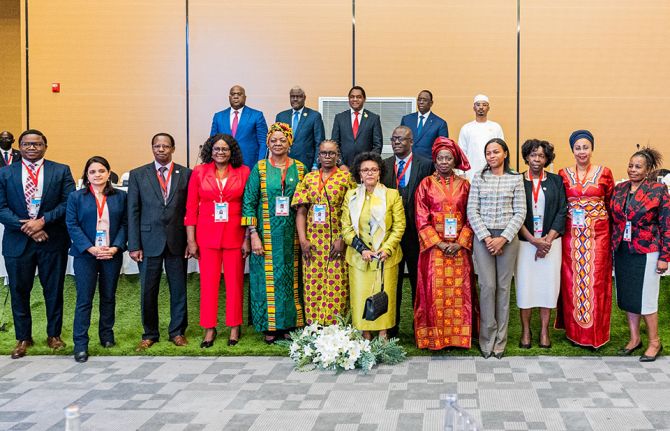
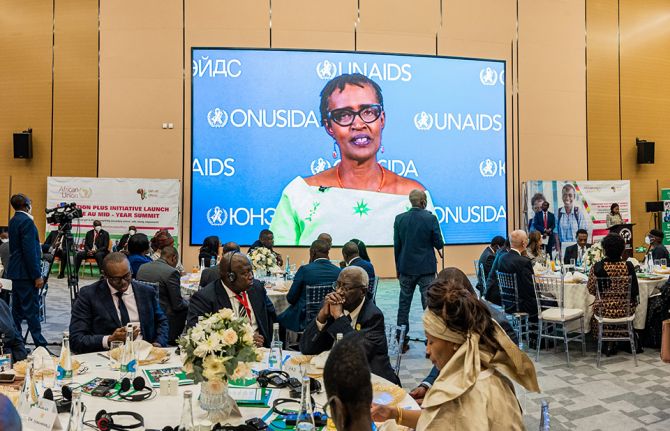
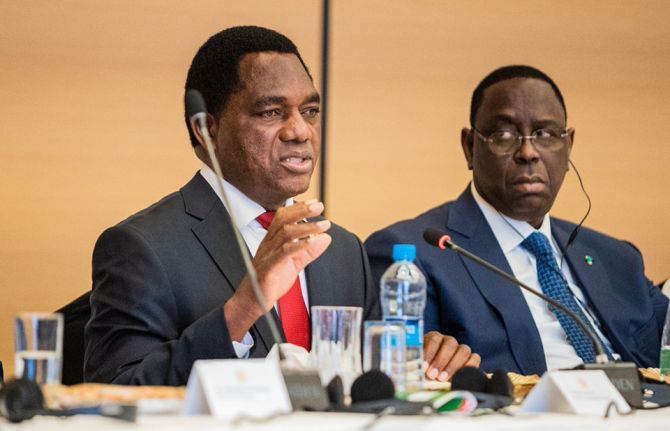
Press Release
African leaders launch the Education Plus initiative – a huge step forward for girls’ education and empowerment in Africa
18 July 2022 18 July 2022LUSAKA, ZAMBIA / GENEVA, SWITZERLAND, 18 July 2022—Leaders meeting at the Africa Union summit in Lusaka, Zambia, have pledged their support for the Education Plus initiative at its continental launch, commiting to take action to keep adolescent girls in school, which will dramatically reduce their vulnerability to HIV.
Every week, around 4200 adolescent girls and young women in sub-Saharan Africa acquire HIV. In 2020, six in seven adolescents aged between 15—19 years old acquiring HIV in the region were girls. More than 23000 young women died from AIDS-related illnesses in 2020, making it the second leading cause of death among women aged 15—29 after maternal mortality in sub-Saharan Africa.
Keeping girls in secondary school and providing them with life skills, training and employment opportunities is key to ending the AIDS pandemic in Africa. Research shows that ensuring that girls complete secondary education reduces their risk of acquiring HIV by up to half, and that combining this with a package of services and rights for girls’ empowerment reduces their risk further still.
Education Plus calls for free and quality secondary education for all girls and boys in sub-Saharan Africa by 2025; universal access to comprehensive sexuality education; fulfilment of sexual and reproductive health and rights; freedom from gender-based and sexual violence; school-to-work transitions, and economic security and empowerment.
“My government has committed to the provision of free primary and secondary education for all,” said President Hakainde Hichilema of Zambia, who hosted the summit. “Education is the greatest equalizer and with appropriate education, everyone is given an opportunity to explore their full potential and be able to participate in the development process. Access to education empowers both girls and boys as it enhances their ability to access decent jobs and other means of production thus alleviating poverty.”
The President of Senegal and current chair of the African Union, Macky Sall, launched the initiative flanked by three other presidents and the Chairperson of the African Union Commission Moussa Faki Mahamat.
“It is my pleasure to join you on the occasion of the ceremony to launch the continental “Education Plus Initiative” under the leadership of the Organisation of African First Ladies (OAFLAD) in support to children and young girls in particular,” said President Sall. “There is need for action to promote women’s rights and autonomy, to fight against the discrimination and violence which girls and women face. We must address gender inequality at all stages of life. At the continental level, AU Member States are committed to accelerating the implementation of gender-specific economic, social, and legal measures aimed at combating the HIV/AIDS pandemic by adopting various policy and legal frameworks including the Maputo Protocol.”
The launch was held in partnership with the Organisation of African First Ladies for Development, convened by the First Lady of Zambia, H.E Mutinta Hichilema.
“I am confident that Education Plus will enable us all to protect, provide and preserve the lives of adolescent girls and young women by enhancing education standards and preventing new HIV infections by use of various interventions,” said Ms Hichilema.
“We lend our voice to the transformative call for gender-inclusive education in Africa,” said Leyla Gozo, Executive Secretary of the Organisation of African First Ladies for Development, “First ladies are uniquely positioned to amplify this inititiative.”
The Education Plus initiative has taken on even greater urgency as the COVID-19 pandemic pushed millions of girls out of school. Even before the pandemic, almost 34 million adolescent girls aged 12—17 years old in the sub-Saharan Africa region were not in secondary school. Evidence also shows that girls are less likely to restart school once they have dropped out.
Ten African countries – Benin, Cameroon, Eswatini, Gabon, Gambia, Lesotho, Malawi, Sierra Leone, South Africa and Uganda – have so far committed to the initiative which is jointly convened by five United Nations agencies, UNAIDS, UNESCO, UNFPA, UNICEF and UN Women, and brings together governments, civil society and international partners.
“We are making progress in Africa but not fast enough,” said UNAIDS Executive Director, Winnie Byanyima in her address to the launch. “We need to urgently address the gender inequalities that still plague the continent, with devastating impacts on poor girls and young women. We don’t have a minute to wait. Working together, we can all end discriminatory laws and harmful social norms, so that our girls are healthy, educated and empowered and can lead our continent, Africa, forward.”
UNAIDS
The Joint United Nations Programme on HIV/AIDS (UNAIDS) leads and inspires the world to achieve its shared vision of zero new HIV infections, zero discrimination and zero AIDS-related deaths. UNAIDS unites the efforts of 11 UN organizations—UNHCR, UNICEF, WFP, UNDP, UNFPA, UNODC, UN Women, ILO, UNESCO, WHO and the World Bank—and works closely with global and national partners towards ending the AIDS epidemic by 2030 as part of the Sustainable Development Goals. Learn more at unaids.org and connect with us on Facebook, Twitter, Instagram and YouTube.
Watch: Education Plus Initiative
Watch: video message by Winnie Byanyima
Our work
Region/country

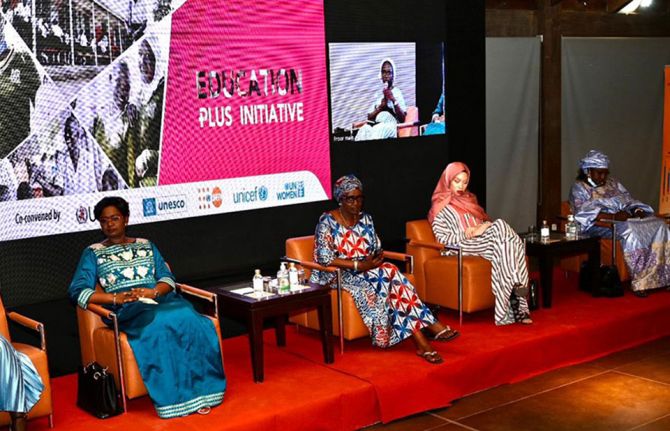

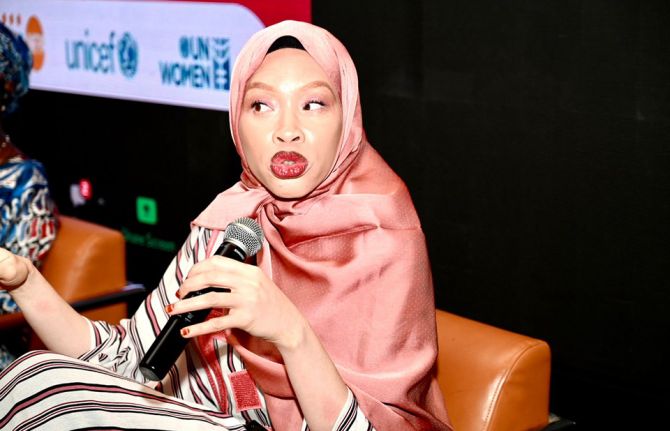
Feature Story
Young women leaders in Senegal push for more education for their peers
24 May 2022
24 May 2022 24 May 2022As part of the Education Plus initiative, young women advocates in Senegal have met with key female figures in the region to discuss the education of girls in sub-Saharan Africa and the challenges they face.
A social work student in her second year of professional training said young women like her who are living with HIV still face stigma and economic marginalization in most spheres of life “Sometimes, the medicines are not in stock, and young women living with HIV often have to share their medication with each other while waiting for a new supply.” According to her, education guarantees a better future for young people, as it did for her in helping her to overcome the challenges she faces because of her HIV status and her difficult upbringing.
Another participant, Maah Koudia Keita (known as Lady Maah Keita), a Senegalese woman with albinism, and a musician, said that women with albinism are victims of harassment and the majority of them have experienced rape and sexual violence.
She is one of three professional female bass players in Africa and the only one in Senegal. She said, “People like me who were lucky to get an education now have to do the work of dispelling myths around women with albinism that drive the violence.” According to Ms Keita, the more educated and aware the community is, the better women and people with albinism can defend themselves.
Adama Pouye, a feminist activist and member of the Senegalese feminist collective that led the Buul Ma Risu (Don’t Mess with Me) movement, spoke at length during the meeting about raising awareness on sexual assault on public transport.
“Every day, you hear violent words and women come to believe that’s what they deserve,” she said. “You are told how far you can go by standards put in place by a patriarchal society, by men, and by religious standards, but our religious interpretations cannot be about oppressing women,” Ms Pouye said.
Young women are key advocates who the Education Plus initiative is working with to rally political leadership, development partners and communities in order to fulfil every adolescent girl’s right to education and health by enabling all girls to complete a quality secondary education in a violence-free environment.
As UNAIDS Executive Director Winnie Byanyima stressed at the meeting, “In this region of western and central Africa, the vulnerability of girls is high.”
She also said that four out of 10 young women are married before the age of 18 years, saying that children becoming brides is a gross violation and a failure to harness the full potential of girls.
“Keeping girls in a classroom, if she stays and completes secondary school, has a protective effect for girls from HIV. What we fought and won for primary school is what is needed for secondary education,” Ms Byanyima said.
Fatou Nar Mbaye Diouf, the Deputy Executive Secretary of the National AIDS Council, Senegal, could not agree more. “We know that allowing girls to complete secondary education protects them from HIV and improves many other health and development factors,” she said.
Sharing key data from Senegal, Ms Nar said the level of comprehensive knowledge about HIV increases with the level of education. “Among young women, it is 10% among those with no education and 41% among those with secondary education or higher, while among young men knowledge of HIV varies from 9% among those with no education to 51% with education,” she said. “Education is key.”
The Regional Director for West and Central Africa for UN Women, Oulimata Sarr, concluded the intergenerational dialogue by saying that girls’ education is not a threat, nor should it be seen as that. “We want to move the needle and move it together with young women,” she said.
Ms Sarr wants the next generation to be supported as they seek more space in decision-making. “We need to pass the baton to young people, who organize differently from us, create an intergenerational legacy with young people holding us to account.”
Learn more
Region/country
Related
 “Who will protect our young people?”
“Who will protect our young people?”

02 June 2025

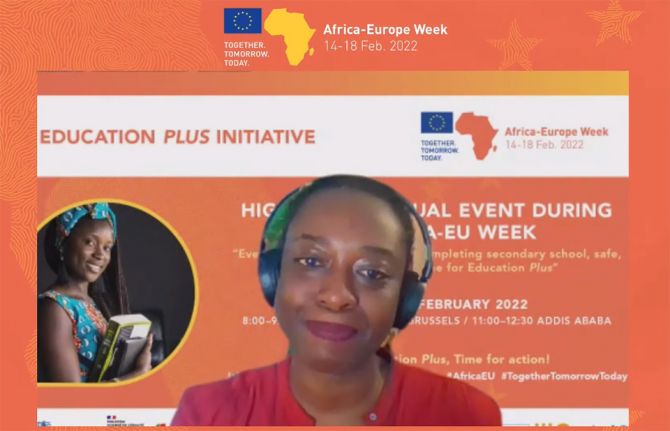
Feature Story
Stronger Africa–Europe partnerships key to advancing education and health rights of adolescent girls in Africa
18 February 2022
18 February 2022 18 February 2022Adolescent girls and young women in sub-Saharan Africa continue to be disproportionately affected by the AIDS epidemic. Approximately 4200 adolescent girls and young women in sub-Saharan Africa acquire HIV every week. In 2020, five in six adolescents aged between 15 and 19 years newly acquiring HIV in the region were girls. An estimated 23 300 adolescent girls and young women died from AIDS-related illnesses in 2020 in sub-Saharan Africa, making it the second leading cause of death of adolescent girls and young women after maternal mortality in sub-Saharan Africa. The figures represent lives disrupted and lost as AIDS remains a public health threat to survival, well-being, human rights and fundamental freedoms.
At an African Union–European Union pre-summit event, Adolescent Girls in Africa Completing Secondary School, Safe, Strong, Empowered: Time for Education Plus, speakers called for robust action to respond to the impact of the COVID-19 pandemic on girls’ education in Africa.
The event, held as part of the Education Plus initiative, drew participants from the African Union, the European Union, African champion countries (Benin and Sierra Leone), the cosponsoring Governments of Finland, France, Portugal and Spain, the Global Network of Young People Living with HIV and the United Nations co-lead agencies.
The Education Plus initiative, launched in 2021 and co-led by UNAIDS, the United Nations Educational, Scientific and Cultural Organization, the United Nations Population Fund, the United Nations Children’s Fund and UN Women, responds to the aggravated risk of HIV infection, high incidences of teenage pregnancy, sexual and gender-based violence and early marriage as well as school-to-work transitions, by calling for the completion of quality secondary education by adolescent girls and young women in Africa. Through the initiative, countries will work to guarantee free and universal access to quality secondary education while providing a Plus package to protect health rights and deliver on gender equality and the empowerment of girls and young women in Africa.
As a high-level political advocacy drive, the Education Plus initiative rallies for accelerated action and investments to prevent HIV, centred on the empowerment of adolescent girls and young women and the achievement of gender equality in sub-Saharan Africa, with secondary education as the strategic entry point.
The pre-summit event reflected on old and emerging challenges to the education and health rights of adolescent girls and young women and the opportunity for countries on both continents to collaborate and make transformative changes.
Quotes
“The newly identified highly transmissible HIV variant is an urgent reminder that we cannot drop the ball on AIDS. The data are alarming, particularly for adolescent girls and young women in Africa and other marginalized groups and communities. Every week, 4200 adolescent girls and young women in sub-Saharan Africa are newly infected with HIV.”
“The biggest problem we have now is more on the transition from primary to post-primary. That’s why the work on secondary education is extremely important. Looking at the learning environment and how we make it conducive for girls, how we mobilize communities and society around social norms that are hampering access and continuation of education and how we find ways for girls to catch up from the impact of COVID-19.”
“Education is at the heart of collective Africa–Europe. The European Union will pay particular attention to the inclusion of girls and women and to reducing gender disparities in enrolment, progression and retention in education and lifelong learning.”
“We need to work together so that we do not lose the gains over the last decades. In moving forward, girls and young women must all acquire—at the minimum—secondary education. The universal secondary education package should entail providing the necessary skills and competencies to address the issues they face, such as sexual harassment, rape, early pregnancy, early marriage, discrimination at work, limited livelihood opportunities.”
“In Benin, we commit to investing in full and equal access to education for both girls and boys. This is enormous, but it is a smart investment. Maintaining girls in school contributes to preventing new HIV infections, early marriage and unwanted pregnancies. The Education Plus initiative has the potential of transforming the lives of adolescents and young women, strengthening society and the nation.”
“Stigma and discrimination in education and health settings for young people in all their diversity is not new. The situation has been protracted because we are not angry enough; if we were, the issues would have been addressed with more urgency. Retain focus on ensuring that adolescent girls and young women in all their diversity are ethically and meaningfully engaged in development.”
“The rights of women and girls and quality inclusive education are top priorities in our development policy. This also means a focus on sexual and reproductive rights, comprehensive sexuality education and freedom from gender-based violence and harassment. These are top on our agenda for cooperation in our new Africa strategy towards stronger political and economic partnership with African countries and the African Union.”
“We are currently finalizing the Education Plus national operational plan, aligned to the National Development Plan and the Education Sector Plan. Because of our experience from Ebola, we saw that a lot of girls were getting pregnant, and we were able to strengthen messages on sexual and gender-based violence on radio and also passed the radical inclusion policy, which allows pregnant girls back to school so that they don’t drop out.”
“Access to health care is a fundamental human right, inalienable and non-negotiable. We need to change the paradigm if we want to change the status quo. We all know that to do so, education is an absolutely fundamental axis.”
“We need young women-led programmes that put girls and young women as key players to the change they want to see. When young women are part of the solution, it empowers them and gives them a purpose of advancing change and transforms not only their lives but also the lives of their peers.”
“Spain is part of the global partnership for education and finances programmes. In this we see that for every additional year that a girl stays in the education system, her income will increase between 10% and 20% for the remainder of her life.”
“Promoting young people’s access to health services and universal access to sexual and reproductive health and rights is a fundamental constituent of health care in Portugal. We focus on overcoming a set of barriers that make access to such services easier and less awkward for young people, including boys and girls.”
Watch
Related
 Government ensures continuity of treatment in Malawi
Government ensures continuity of treatment in Malawi

10 February 2025



